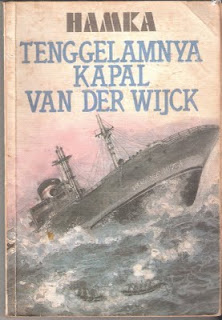
The Indonesian socialist literary critic Bakri Siregar wrote that Van der Wijck was Hamka's best work, noting with interest the way in which Zainuddin writes about politics after losing Hayati. The work has also had several printings in Malaysia. The eighth printing, in 1961, was published by Nusantara in Jakarta, with printings after that by Bulan Bintang. A second printing was with Syarkawi's publisher, then the next five printings, beginning in 1951, were by Balai Pustaka, which had become the state-owned publisher of Indonesia after independence in 1945. Syarkawi by using a private publisher he avoided the censorship imposed on authors by Balai Pustaka, the official publisher of the colonial government. Īfter this generally favourable feedback, Hamka decided to publish it with a private publisher owned by his friend M.

However, conservative Muslims denounced the book, arguing that an Islamic scholar should not write romances. Hamka also received fan mail, in which readers described the book as reflecting their own lives. According to Yunan Nasution, an employee of the magazine at the time, when the magazine was shipped to Kutaraja, Aceh (now Banda Aceh), readers would wait at the train station to buy and read the next instalment as soon as possible.
#Download tenggelamnya kapal van der wijck di ganool serial
Van der Wijck was first published as a serial in his weekly Islamic-themed magazine Pedoman Masjarakat in Medan in 1938. and continued to criticise adat in his works. Hamka found some traditions incompatible with the tenets of Islam and common sense. Like Di Bawah Lindungan Ka'bah ( Under the Protection of Ka'bah 1938) before it, Van der Wijck is critical of Minang adat (traditions), such as the treatment of persons of mixed descent and the role of women, an issue shown through Hayati's work to be an ideal wife despite Aziz mistreating her. After he dies, he is buried next to Hayati. Zainuddin's health worsens not long afterwards. They find her in a hospital, where Zainuddin and Hayati make up she then dies in his arms. Hearing the news, Zainuddin and Muluk rush to Tuban to search for her.

The next day she boards the Van der Wijck, which sinks off the coast of northern Java. Zainuddin, who has suffered from his longing for Hayati, spurns her and tells her to return to Sumatra. After a period living with Zainuddin, Aziz runs away to Banyuwangi, leaving Hayati for Zainuddin in a letter, Aziz writes that Zainuddin is more deserving. However, their relationship has soured and Aziz's temper leads to him being fired, leaving the couple homeless. Aziz and Hayati also move to Surabaya, after Aziz is transferred. In despair, Zainuddin and his friend Muluk go to Java, first to Batavia and then to Surabaya, where Zainuddin becomes known as a writer and philanthropist. Although Zainuddin receives a sizeable inheritance from Mak Base, he is too late to inform Hayati's family, and Aziz marries her. Aziz, who is of purely Minang descent and a noble background, is favoured by her family they look down on Zainuddin, who is poor and of mixed heritage. However, Khadijah's elder brother Aziz falls in love with Hayati, leading to Zainuddin and Aziz to compete for Hayati's affections. One day, Hayati goes to Padang Panjang to see Zainuddin and stays with her friend Khadijah. He decides to move to Padang Panjang, although he continues to write to Hayati.

Although he loves Hayati, the daughter of local nobleman, he is not allowed to be with her. As a person of mixed descent, he faces much discrimination from Minang conservatives. He is now living with his father's friend Mak Base in Batipuh, Sumatra.

His Minang father died in exile after killing a relative over inheritance his non-Minang mother has also died. It was while in Medan that he wrote Van der Wijck, which was inspired in part by the sinking of an actual vessel in 1936. In 1935 he left Makassar for Medan, North Sumatra, where he became the editor of an Islamic weekly magazine, Pedoman Masjarakat. During these travels, especially while in the Middle East, he extensively read works by Islamic scholars and authors, such as those by the Egyptian writer Mustafa Lutfi al-Manfaluti, as well as Arabic-language translations of European works. After a trip to Java and Mecca beginning when he was sixteen, he became a religious scholar in Deli, East Sumatra, then in Makassar, South Sulawesi. Haji Abdul Malik Karim Amrullah, better known as simply Hamka, was the Sumatran-born son of a devout Muslim who viewed local traditions as hindering the progress of religion – his father's opinions influenced his.


 0 kommentar(er)
0 kommentar(er)
